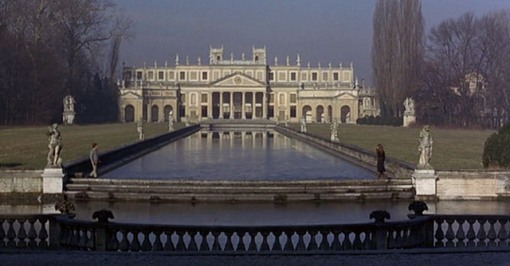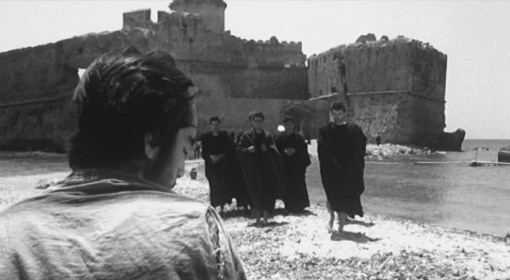The more I see from Pasolini, the more difficult I’m finding it to “get him” or just peg him into one unifying style. Again, the whole concept of him being a “messy” filmmaker is reinforced by the fact that he is juggling two completely different stories here. One seems more Pasolini-esque than the other. The cannibal story definitely sits quite comfortably alongside the ancient documentary aesthetic of Oedipus Rex and Il Vangelo secondo Matteo. There’s another story, though, and it seems to take up a larger part of the film. It involves the son of a German industrialist and his ambivalence towards his girlfriend, who his protesting the endeavors of a family friend.
If the cannibal storyline (featuring frequent Pasolini collaborator, Sergio Citti and the greatly underused Pierre Clementi) is indicative of Pasolini’s ability to tell story that are devoid of time but still feel quite real. It’s a nice sample of his ability as a filmmaker. Lots of camerawork following Clementi walking around as he looks for means of survival and almost no dialogue. It feels a little cheap to compare him to Herzog, but I guess that’s the only other guy who was doing this at the time. I tend to avoid the connection because Herzog relies on his films as observations, where as Pasolini’s work seems layered with meaning.
The other story is a complete 180, both in style and content. It involves the always enjoyable Jean Pierre Leaud and the lovely Anne Wiazemsky, but both neither has been so frustrating. Sure, they are nice to look at (in a purely physical way) and Pasolini’s Ozu-esque way of framing their faces is impressive, but it’s been a long time since I’ve seen something so dry and stuffy. It’s hard to hold this as a negative, though, since it seems almost like a parody on the part of Pasolini. He’s juxtaposing something that emphasizes the visuals with something that is all about the dialogue.
As unsavory as the Leaud and Wiazemsky storyline is, it does manage to look nice. It gets a little repetitive after awhile, sure, but I think it’s a little unfair to dismiss the effort completely. Who knows, if these characters/mouthpieces were speaking English, would they be that far from the people that inhabit Hal Hartley’s world? I don’t think so, but that speaks to Hartley’s talents as a filmmaker. Pasolini deserves credit for trying this sort of thing that feels fairly fresh, even if he is just replicating Godard in a way. It probably is no coincidence that his La Chinoise featured the same two actors. To Pasolini’s benefit, he does take a very silly approach to the entire story, especially with the ending, which sort of reinforces my suspicions that it was a critique of overly talkative “art” films of the time, rather than a imitation.











